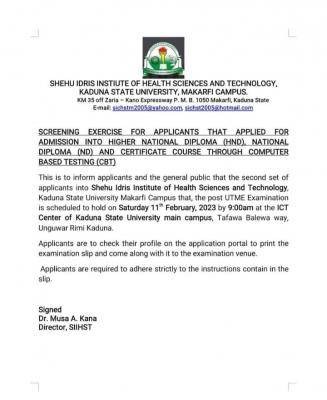
The constraints of the Joint Admissions and Matriculation Board’s testing model are that regardless of the overall performance of the candidates, only one in every five of them will secure admission into higher institutions.
This assumption supports the claim that JAMB purposely fails four in every five candidates employing any means necessary to arrive at the desired goal of matching the candidates with the available admission slots.

However, the exam body’s management is not apprised of the grave harm examination failure does to candidates’ self-esteem. Given that the future of Nigeria is inextricably coupled with its capacity for providing quality high education for all candidates, it is suggested that the country adopts the moral equivalent to purposely failing candidates in JAMB exams for lack of admission slots. This will incorporate the following initiatives: Reviewing on a case-by-case basis the merits of the so-called “illegal universities” that were shut down by the authorities; establishing a pathway for achieving accreditation status in the Nigerian context for these universities and; establishing a protegee programme for these institutions.
Inferring from the Steve Oronsanye Committee’s Report, the prospects of the present administration establishing a new university is remote; so, what is the rationale for closing down 41 universities established by private entities? These institutions may have been illegally constituted. Couldn’t they be given opportunities to cure their deficiencies? Alternatively, the Federal Government can invoke its power of eminent domain and take possession of these institutions for the general good.
The schools could serve as campuses of pre-existing universities or could be autonomous. The rationale for this approach is that it is easier to start a new business venture from a point higher than the proverbial Ground Zero. As pre-existing institutions, they were above Ground Zero when they were shut down. From economic perspective, the factors of production are already harnessed in each of these institutions to deliver instruction, conduct research, maybe and partake in community engagement which are the traditional roles of a university. The government can start by passing a bill prescribing a pathway for legitimizing all or some of these institutions in order to ease the congestion at the point of entry into higher education.
Using the Pathway Approach, the policymakers can establish a pathway through which some or all of these institutions can achieve accreditation in a certain time rather than destroy, again, a reservoir of knowledge. In order to determine which “illegal universities” could be legitimized, the policymakers should consider such factors as, does the university have a clearly defined purpose commensurate with its mission? Did the university management organize those resources necessary to achieve its purpose? Was it achieving its purpose at the point of closure? And did the university have the administrative capacity to resume operations?
The pathway requirements will include assurance reviews in a 12-year cycle, one in the 6th year of the plan and the other in the 12th year. In addition, the university will be required to demonstrate financial viability as shown by a Security Deposit of $2m in the treasury to cover the cost of transferring students to other schools should the university become insolvent and/or unable to meet accreditation requirements. Initially, the universities could be granted provisional accreditation.
This provisional status will terminate at the 12th year point and will offer them opportunities of awarding baccalaureate degrees in three programmes, Bachelor of Science, Bachelor of Arts and Bachelor of Business. The protegee programmes would enable these institutions under the guidance of first generation universities to successfully walk through the pathway meeting certain milestones as they strive for the 12th year assurance Review.
The other core requirements would be meeting the standards for on-site reviews and developing a portfolio of evidence demonstrating successful compliance with all accreditation standards and requirements. The foregoing affirms the moral equivalent of unjustifiably failing candidates in JAMB’s exams in making higher education available and accessible for purposes of adapting to democratic pluralistic society.
Dr. Peter Ejirika, CPA
Higher Education Management
practitioner
University of Mary Hardin Baylor, Texas



